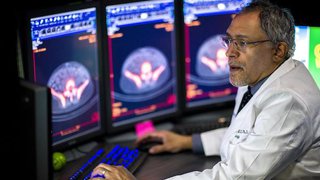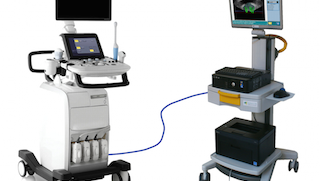Using Imaging to Diagnose and Treat Countless Conditions
Radiology is a medical specialty that incorporates many types of imaging technologies. Although they work differently, these noninvasive technologies all take pictures of the inside of the body to diagnose or treat conditions and guide biopsies, catheterizations, or other procedures.
Our specialized physicians use radiology studies to look inside the body, often preventing patients from undergoing exploratory surgery.
UT Southwestern offers virtually every type of standard radiologic imaging, as well as a number of sophisticated technologies and services not available at other medical facilities.
We are committed to achieving the highest standards of patient care and staying on the leading edge of new developments and clinical applications in the ever-changing field of medical imaging.
Our specialized team performs nearly 1 million exams annually across the facilities we serve. We also provide patient evaluations and clinical consultations for specialty imaging services.
Our radiologists also take part in a variety of basic and clinical research activities. Areas of study include clinical outcomes, new imaging-contrast agents, and cancer imaging.
Radiology Subspecialties
UT Southwestern’s Radiology program comprises subspecialties that include:
Radiology Program Highlights
Highlights of UT Southwestern’s Radiology program include:
- Reduced-radiation CT scanning: This latest-generation CT scan is faster and easier for doctors to read, and it delivers one-third less radiation than standard CT imaging.
- Positron-emission tomography (PET): Our radiologists work in our own PET facility to conduct whole-body scans or organ scans to detect cancer in its early stages or to diagnose a variety of neurological and psychiatric conditions.
- Mobile mammography: A customized 18-wheeler brings mammograms to workplaces, churches, community outreach events, and other locations.
- Noninvasive vascular imaging: This technique uses CT, MRI, and ultrasound imaging to diagnose vascular diseases and assist our cardiologists, cardiothoracic surgeons, and vascular surgeons with planning surgical procedures.
- Interventional radiology: We use the latest imaging technologies to conduct more than 5,500 innovative, minimally invasive surgeries each year.
Clinical Trials
As one of the nation’s top academic medical centers, UT Southwestern offers clinical trials aimed at improving radiologic procedures.
Clinical trials can give patients access to leading-edge technologies that are not yet widely available. Eligible patients who choose to participate in one of UT Southwestern’s clinical trials might benefit from imaging technologies years before they are available to the public.






